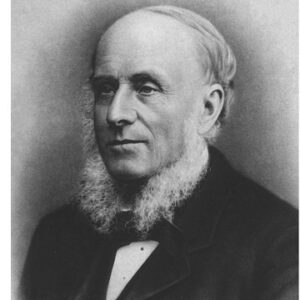Alexander Bain was a well-known philosopher and logician who studied psychology, linguistics, logic, and moral philosophy. Many of his literary works, such as “The Senses and the Intellect,” “Mental and Moral Science,” “Education as a Science,” and “The Emotions and the Will,” received widespread praise. He received numerous honors, including the Blue Ribbon and the Gray Mathematical Bursary. “The Senses and the Intellect” and “The Emotions and the Will,” two of his writings, helped him earn a reputation among independent thinkers. He authored various textbooks such as “Higher English Grammar,” “An English Grammar,” “A First English Grammar,” and others to improve the standard of English language instruction. He wrote a number of essays to “Mind,” a philosophical journal, under the editorship of George Croom Robertson. After Robertson resigned as editor, he even footed the bill for its publication. It was Bain who brought physiology to the clarification of mental states for the first time in 19th-century Britain. He was the first to propose the concept of psychophysical parallelism. He was the first to relate physiological and psychological processes. He tried to uncover a link between mental and behavioral events as part of his research.
Childhood and Adolescence
Alexander Bain was born in Aberdeen, Scotland, the son of a weaver and veteran soldier George Bain and Margaret Paul. He dropped out of school at the age of eleven to work as a weaver.
Before enrolling at Marischal College in 1836, he attended lectures at the Aberdeen Mechanics’ Institutes and the Aberdeen Public Library. There, he was influenced by a number of academics.
He encountered John Stuart Mill, a British philosopher and political economist, during this time. In 1840, he published his first essay, “Electrotype and Daguerreotype,” in the “Westminster Review.”
He was earning his undergraduate degree at the time his first essay was published. He went on to study mental philosophy, mathematics, and physics later in life. He received a Master of Arts with Highest Honors at the end of his studies.
Career of Alexander Bain
For three terms, he served as a substitute for D. Glennie, Marischal’s professor of Moral Philosophy. He assisted John Stuart Mill with the revision of the manuscript of “System of Logic” in addition to writing for “Westminster Review.”
In 1843, he published his first review of this book in “London and Westminster.” Anderson was appointed Professor of Mathematics and Natural Philosophy at Anderson’s University Glasgow in 1845.
He left his job after a year and continued to work on his writing. In 1848, he moved to London to work under Si Edwin Chadwick at the Board of Health. He became interested in social reform initiatives while he was there.
During this time, he became a part of the intellectual circle, which included figures such as English historian George Grote and John Stuart Mill.
In 1855, he published his first significant work, “The Senses and the Intellect.” He was the Examiner in Logic and Moral Philosophy at the University of London from 1857 until 1862.
He was assigned to the Regius Chair of Logic and the Regius Chair of English Literature at the University of Aberdeen by the British Crown in 1860. During his time at the university, he spearheaded efforts to improve education in the north of Scotland.
He established a School of Philosophy at the University of Aberdeen as part of his efforts. He also took the required steps to strengthen the English grammar and composition teaching system in the United Kingdom.
For the second time, he served as the Examiner in Logic and Moral Philosophy at the University of London from 1864 until 1869. He also served as a Moral Science Instructor for the Indian Civil Service examinations.
In 1868, he wrote “Manual of Mental and Moral Science,” in which he laid out his philosophical beliefs. In 1876, he began publishing the philosophical journal “Mind” after completing many textbooks.
Psychophysical parallelism, his idea, is often used by current psychologists. A subject like psychology has been recognized as a unique discipline of science as a result of his outstanding contribution.
Major Projects of Alexander Bain
He examined the idea of energy conservation and the application of logic principles to many fields in his book “Logic,” published in 1870. He wrote this book for pupils based on John Stuart Mill’s ideas.
Achievements & Awards
In 1871, the University of Edinburgh bestowed upon him the honorary degree of Doctor of Law in recognition of his exceptional contributions to Scottish education and social change.
Personal History and Legacy
He had two marriages but no children. He spent his final days in solitude in Aberdeen, where he died. He asked that no stone be placed on his grave before he died. In 1904, his autobiography was released.
Estimated Net Worth
Alex Bain is one of the wealthiest soap opera actors and one of the most popular. Alex Bain’s net worth is estimated to be $1.5 million, according to Wikipedia, Forbes, and Business Insider.
Trivia
Since 1883, the University of Aberdeen’s Philosophy Department has awarded the Bain Medal to the candidate who achieves First Class Honors in Mental Philosophy, in honor of this famous educationalist’s contribution to the field of education.


